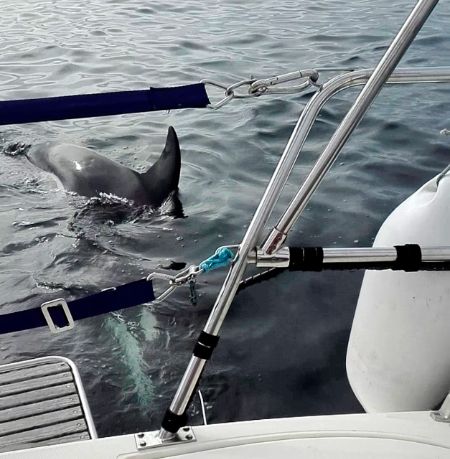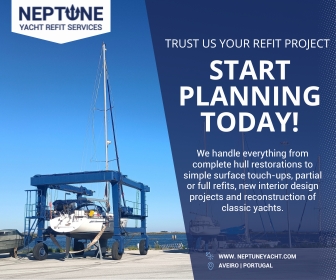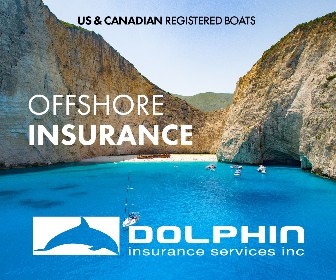Spain: Compensation Sought for Orca Damage to Sailboats
The Atlantic Orcántic Working Group (GTOA) is asking the Spanish Government to consider providing financial compensation for sailing boats that are damaged as a result of Orca interactions in Spanish waters.
Published 2 years ago
S

The Atlantic Orca Working Group requests the inclusion of an item in the general budgets of the State (Spain) for compensation for damage caused by Orcas to sailboats during interactions.
The Orca (Orcinus orca) that inhabits the Iberian Peninsula, is one that frequents the Strait of Gibraltar in spring, moving north in autumn to the coast of Galicia. It is a sub-population of the Atlantic killer whales, whose closest relatives would be the killer whales of the Canary waters, and are genetically isolated from those that inhabit Norway and Iceland.
The killer whale is considered a species protected by national and international laws, so intentional harm cannot be caused to these animals. It was recently declared “critically endangered” by the IUCN red list of species.


Encounters with killer whales are classified as sightings if the specimens are simply observed and ignoring anything around them or interactions if they approach boats. The interactions are diverse and varied but have in common the approach and physical contact of the animals with the hull (of the boat).
From July 2020 to October 2022, 443 interactions of killer whales with sailboats were detected between the coast of Morocco and French Brittany. 51% of these reported damage and 19.6% were considered serious (given that the boats were unable to sail due to damage and had to request towing).
The Spanish coast corresponds to 63.7% of all cases (n=283) distributed over the years as follows: 2020-35 cases, 2021-122 cases and 2022-126 cases, of which a total of 70 cases had no damage, 70 cases had minor damage and 33 had serious damage, that is, they had to be towed to reach port.
Estimates of Damage Costs
Naval experts have been consulted to analyze the approximate costs of the damage, from which it could be estimated that the total damage since 2020 amounts to €2,202,733 for all vessels in all areas, excluding the case of sunken vessels.
The Spanish coast hosts 63% of all light damage interactions, 41% of severe damage interactions, which cannot navigate, and 100% of detected waterways. Based on these data and the aforementioned repair cost estimates, we can indicate that it represents 65.1% of the estimated total cost, corresponding to €1,435,144.
Considering that this amount corresponds to three years, even asymmetrically, we estimate that for 2023, it would be necessary to have at least half of that amount to cover the expenses derived from the damage caused by orcas interacting with ships, especially sailboats, corresponding to an amount of €717,572.
Therefore, the Atlantic Orca Working Group requests the Spanish government and the political organizations represented in the Congress of Deputies to consider in the general state budget the concept of claiming compensation for damage and breakdowns in ships due to the interaction of a emblematic and protected species, the Iberian killer whale (Orcinusorca), for an amount of €717,572, as well as the mechanism for expert assessment and management of this compensation to be available in the 2023 financial year.
Grupo de Trabajo Orca Atlántica
………………………………………………………………………………………………………………………………………….
Related News:
- Another Yacht Sinks after Encounter with Orca (Noonsite)
- Second Sailing Boat Sinks after Interaction with Orca (Portugese Resident)
- Se hunde frente a Viana do Castelo un velero francés tras una interacción con orcas (La Voz de Galicia)
- Boat sinks after Interaction with Orca (Marine Industry News)
- Noonsite Orca and Yachts page (for more news and links).
………………………………………………………………………………………………………………………………………….
Related Links:
- Cruising Association Orca Interaction Report Form
- RYA Orca (Killer Whale) Guidelines (RYA)
- Atlantic Orca Working Group
- Orca Iberica Facebook Page
- ICNF Recommendations Not to Approach Orca
……………………………………………………………………………………………………………………………………..
Noonsite has not independently verified this information.
Related to following destinations: Atlantic Coast (Portugal), North West Spain, Portugal, South West Coast (Spain), Spain
Related to the following Cruising Resources: Orcas and Yachts, Safety, Safety and Medical




GTOA lost its credibility in the sailor community… This initiative is once more NOT a solution ! This workgroup only interest is protecting the orca’s. They don’t care about sailors ! As the orcas are now learning how to sink sailboats, they propose 700€ compensation ? Sorry guys, this is not serious. This is the third season of orca ATTACKS, and please stop calling them interactions. Nothing has been done, no solutions has been provided. The name GTOA implies that it is a workgroup, what work has been done ?? As a consequence of the groups inaction we see now that:
1. Boats are carrying all sorts of defenses, probably illegal in Spain, to protect their ship and their lives.
2. We are sailing this area right now. We met sailors who are turning back and go home.
3. In the webinars and gatherings of sailors preparing to leave all north european countries this problem is the hottest topic. The preferred route for 2023 is now to cross from UK to the Acores, then cross to Madeira and finally cross to the Canary islands. This sail plan avoids the whole spanish and portuguese coast. GTOA may be pleased with this result, but what about all the marina’s and the tourist industry ? Are they pleased ?
4. Even local sailors,Spanish and Portuguese have had enough of this since they also don’t dare to sail out to see anymore.
When will GTOA deliver somer results of their “work” ???
Response from John Burbeck of the Cruising Association Orca Project Group, who work closely with GTOA:
Whilst I understand the frustrations of the contributor and share his concerns about the welfare of crews, it is clear that in his response there are some significant misunderstandings in play. The first is that it is now clear, from the work we and others have done, that there is no easy solution short of killing all the Gibraltar Straight orcas, and no thinking person is suggesting we do that. It is after all their natural environment. If there was a solution it would have been found by now and introduced.
The GTOA are a small group of Marine Biologists who study the orca. They are not sailors, but they do care about them. It was because of their lack of understanding of sailing and the needs of sailors that they partnered with the Cruising Association, who are very knowledgeable and are keenly interested in the safety of boats and their crews, though not at the expense of hurting the orca. Together we have collected a lot more information this year and made it publicly available to all crews, not only about actual interactions, but also about incident free voyages in the worst affected areas.
The hope is to identify what works, and as importantly what doesn’t. Many seem to incorrectly confuse GTOA with the government authorities. GTOA have no funding to find a solution and are working on a voluntary basis. They should be seen as one part of the solution and certainly not as an uncaring body of authority. When we first spoke to GTOA it was clear that they had no concerns about reversing, but were concerned that the manouvre may be dangerous for sailors. However following our early conversations GTOA were happy to advise the Spanish and Portuguese governments to approve reversing as a defensive measure (which Portugal has done).
The word “interaction” is used because not all encounters are attacks, according to the detailed reports from skippers, some are more akin to investigations, or play. Indeed in the news report it is acknowledged that not all the boats sustain damage. That doesn’t make it any the less frightening for the crew, although some have reported being more amazed than frightened.
The contributor asks when the CA might publish some findings and the answer is that we are already publishing all reports including skippers’ comments, together with a comparison of data between interactions and the control group of uneventful passages. We are only 6 months into the project and already some trends are emerging, which we have pointed to on social media with suitable caveats as to statistical significance at this early stage. We are about to run a more detailed analysis of the data and as we identify trends, we will continue to publish any findings. All the latest findings are on our website http://www.theca.org.uk/orcas.
Together with the GTOA this season we altered the safety advice to include reversing when safe to do so. We have advised voyaging in shallower water, close to shore to avoid interactions when safe to do so. We have noted that a sudden loud noise and antifoul colour may make a difference and will be looking at that in more detail. We have shown that towing a fishing line and using a pinger do not appear to have any influence on whether an interaction occurs. And as stated above, we are about to put all the data we have through a sophisticated data analysis process to see if there is anything we have missed. We are also looking for reasons why reversing ends an interaction in some cases, but not all. I agree it is not ideal, but that is where we currently are.
The Portuguese authorities and organisations are now engaging with this problem and it is likely that funding will be made available for some project work next season. However, we are not expecting a sudden dramatic solution unless the orca suddenly decide to stop, which is what other pods who have engaged in unusual behaviour elsewhere have done .
What we will do is continue to make whatever good advice there is available to all interested parties and to continue to maintain the best publicly available record of interactions and comparative data that exists.
John Burbeck
Cruising Association Orca Project Group
http://www.theca.org.uk/orcas